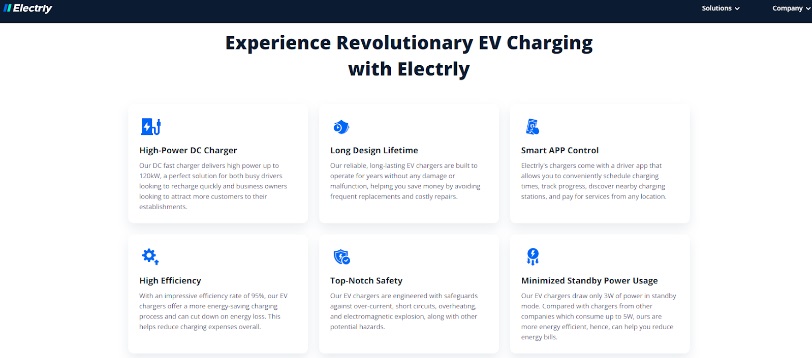Electric vehicles are changing the game to reduce carbon emissions and conserve our environment. They draw electricity from a rechargeable battery instead of fossil fuel leaving no tailpipe emissions.
As a result, the demand for EVs has increased, leading to a need for more charging stations. But since there isn’t enough charging architecture yet, many EV drivers tend to ask themselves, ‘Can I charge my EV anywhere?’
The answer is Yes, and this guide will show you just that. Let’s dive in.
Is it Possible to Charge My Electric Vehicle Anywhere?
Unlike the usual gas stations, EV charging stations’ ideal locations are primarily areas where drivers tend to leave their cars for considerable periods. Thanks to technology. Companies like Electrly make it easy to acquire and set up a charging station near me for the utmost convenience.
Electrly: An Industry-Leading EV Charging Station Solution Provider
Electrly was founded in 2015 and has solidified its position as a top EV charging products supplier in 30+ countries. Some of its products include DC fast chargers, level 1 & 2 AC chargers, portable chargers, power modules, etc., for residential, commercial, and industrial settings.
All these chargers are safe and reliable as they are tried and tested to ensure no current leaks, overheating, or other issues. Even better, Electrly acknowledges your business consistency needs and allows for personalized white-labeling and OEM re-branding. The order process is straightforward and quick as highlighted below:
How Electrly Works
- Send your EV charging solution requirements to Electrly.
- Get a proposal of a suitable solution.
- Get a free quote of the prices and details.
- Place an order and pay.
- Schedule production and delivery of the products.
Why Electrly for EV Charging Products
The following are the key benefits of working with Electrly for your EV charging solutions:
- In-house manufacturing.
- Well-established industry partners.
- Competitive prices with bulk discounts.
- Allow the purchase of as little as a single EV charger unit.
- Long-life design.
- High-efficiency solution.
- High-power DC charger.
- Minimized standby power usage.
- Top-notch safety.
- Smart APP control.
Most Common Charging Points for Electric Vehicles
So far, it is rare to find EV charging stations as they can only be found at specific locations. But that just changed with Electrly charging station solutions that can be set up in different areas for the utmost convenience. That includes
1. At Home
Home charging is the most popular method of EV charging and accounts for over 60% of EV charging. Since most cars are stationary at night, EV drivers can plug in their vehicles overnight. This is cheaper than charging at a public station and allows them to wake up to a fully charged car.
There are two types of charger levels that you can install at home, a Level 1 charger or a Level 2 charger:
Level 1 charger
This is the slowest method but also the cheapest. It entails charging the vehicle via a standard wall socket without installing any equipment. This is possible because all EV cars come with a charging cable.
Level 1 charging is suitable for drivers who only drive 30 to 40 miles daily and have time to charge overnight. It is also ideal for hybrid vehicles since they have smaller batteries. A level 1 charger adds between 3.5 – 6.5 miles in the driving range per hour.
Level 2 charger
This is a much faster solution that adds around 14 – 45 miles of driving range each hour. However, it requires the installation of a charging station with a dedicated 208 or 240-volt electrical circuit to make it work.
Since a level 2 charger uses a similar standard connector to level 1, any EV can recharge at a level 2 charger, making them suitable for home use.
To set up a level 2 EV charger at home, you will require the services of a professional electrician. You must also obtain a permit from a local authority and confirm that your home’s electrical supply can accommodate the additional burden. Finally, ensure you have a private parking space, driveway, or garage.
2. At Public Areas
Public places are the second most popular place for EV charging, accounting for about 30% of EV drivers. As electric car usage increases, governments and private businesses are investing heavily in EV charging infrastructure.
Public charging stations can be found at gas stations, hotels, hospitals, business parks, and more. If you need to locate one quickly, simply search online via a website or EV charging app.
Types of Public Charging Stations
Below are the types of EV chargers you are likely to find at a public charging point:
Level 2 Charger
Level 2 chargers are popular in public places because they are relatively fast and time efficient. For example, at a maximum output of 22kW, they can add 75 miles to your battery range in an hour.
The charging points are usually on a pole, mounted on a wall, or standing on the ground. However, how fast your car charges will also depend on the circuit capacity, battery type, and charger configuration.
DC Fast Charger
This is also known as level 3 charging and is the fastest way to juice your car battery. It charges the car directly, bypassing the AC/DC converter onboard. This enables it to deliver more power faster. Thus, a DC charger can recharge a car within minutes.
Due to their speed, Direct Current chargers are ideal for commercial locations, including short-stop areas like gas stations. But, since they run on a 480-volt connection, they are unideal for homes and not all EVs are equipped for DC charging.
3. At Workplaces
For EV drivers lucky enough to work at places that offer charging services, juicing their vehicles at work is a convenient option. Often, workplaces offer their employees this service for free. According to research, around 34% of EV drivers regularly charge at work.
As EV ownership grows, more and more drivers are requesting this service from their employers, and companies are agreeing as it can add to talent retention. It is also an effective way to attract repeat business from EV-driving clients.
Things to Consider Before Charging an EV Anywhere

Take into account the following factors before visiting an EV charging station:
- Charging station location
Consider where the charging station is located and if you have enough battery left to get there. You can use EV charging apps or websites to locate charging stations.
- Charger type
Different EVs are compatible with different chargers. Check your charger type before visiting a charging point. You can find these details in the car manual/handbook.
- Charging time
Depending on the charger’s level, various EV chargers power your car at different speeds. Thus, consider how long your car battery will take to charge entirely.
Frequently Asked Questions (FAQs)
Ques 1) Is my electric vehicle compatible with any charger?
Generally yes. Most EV chargers are universal and use a similar standard plug for level 1 and level 2 chargers. Variations mainly occur at level 3 since not all EVs allow you to use a DC fast charger. CHAdeMo and CCS are the most popular connector types.
Ques 2) How can I know which EV chargers are appropriate for my car?
To know an appropriate charger, you need to find out what type of charging port your car has. Discover this by checking your car manual or enquiring from your dealer or lease company. When looking for a charging station, use apps that allow you to check which connector types are available at a station.
Ques 3) Can I use an EV charging station myself or need assistance?
While it may not seem like it, EV charging stations are pretty easy to use, and you only have to do it once to get the hang of it. But, before you can plug in your car, most stations will require you to create an account for ease of payment. Usually, they will offer you a card you can use to activate a charging session.
Steps:
- Open your car’s charging port.
- Pick the charger from the holster and plug it into your vehicle.
- Take a stroll or sit around for a while as your car charges.
Tip: This could take some time. Thus, it would be best to go to a charging station close to a restaurant or coffee shop where you can pass time.
Ques 4) How long does an EV take to charge?
It depends on your car’s battery size and the type of charger. Level 1 charging can take 10h to 40h, while level 2 takes between 1h to 20h. The fastest option, level 3, can last between 7min to 2h.
Ques 5) What is the cost of charging an electric car?
The charging cost varies depending on the car model, battery type and size, how long you charge, and location. Charging your car from empty to full at home will cost between $3 to $14. This cost rises to a range of $8 to $28 when you charge from a level 2 public charger. Using a DC fast charger will set you back between $14 to $47. These ranges cover all types of EVs.
While some people apply charges based on time, most charging points bill you per kWh. For example, drivers in New York pay around 35 cents per kWh. Some places offer free parking as you recharge, while others add parking costs.
Ques 6) How reliable are EV charging stations?
Generally, EV chargers are about 80% to 85% reliable. A public EV charging study done in 2022 found that at least 1 in 5 charging attempts failed. This means it is not uncommon for EV chargers to fail. While this is often due to software or hardware glitches, vandalism also plays a role in some scenarios. Also, public chargers are more prone to damage than those at home.
Ques 7) Do electric vehicles charge themselves?
No. There is no fully self-charging EV currently. While some can recharge through regenerative braking or via a generator connected to the engine, the recovered energy is very little.
Ques 8) Is it okay to charge an EV in the rain?
Yes. The technology on an EV car makes it safe to charge in the rain. The charging mechanism won’t be affected and your car battery will charge normally.
Summary
I hope this guide has answered all your questions about charging EV cars. You now have a full understanding of how the different chargers work and can plug in your electric vehicle with ease. But, in my experience, a home charging point offers more convenience compared to public chargers.
For that, you should consider consulting Electrly for their services. Electric cars are more affordable to charge than fueling a petrol or diesel vehicle. In the long run, driving EVs is cost-effective and environmentally responsible. Thus, if you want to purchase a vehicle, opt for an electric one.










